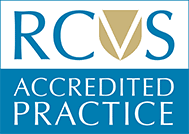Welcoming a new arrival into the family is a very exciting time. There are lots of activities, environments and enjoyment yet to experience – your little one will be raring to go! This is why we have prepared some advice to help guide you through those early weeks and months.
Preventative healthcare
While settling your new family member in, it is a great time to consider all elements of their healthcare. Vaccinations, parasite control, neutering/spaying procedures and regular health checks are so important to ensure your kitten or puppy starts life on the best path to long-term wellness.
Puppies
A regular vaccination programme for dogs will help guard against a number of preventative diseases such as:
- Distemper
- Parvovirus
- Kennel Cough
- Leptospirosis
- Parainfluenza
Such vaccinations will also help to stop the spread of these diseases amongst other puppies and dogs in the area. Puppies can be vaccinated as young as six weeks of age, with a second injection from ten weeks of age. Speak to your vet for the right protocol for your puppy.
Kittens
Essential vaccines are recommended for kittens to safeguard their wellness against:
- Cat Flu
- Feline panleukopenia virus (FPV)
- Feline leukemia virus (FeLV)
The ideal age for your kitten’s first vaccination is eight weeks (or between seven and nine weeks), with a second injection three to five weeks later. This will be for the core vaccines.
Why not talk to one of our friendly team about our pet healthcare plan and what it includes, from regular health-checks to vaccinations and boosters, you can get peace of mind across the year.
Neutering
Although your new arrivals are still young and exploring new experiences and environments, it’s never too soon to think about the next steps of their lives. Neutering of dogs and cats has significant benefits to their lifestyle, behaviour and long-term health.
Cats should be neutered from four months of age to prevent unwanted pregnancies.
Dogs can generally be neutered from six months, but please ask one of our experienced team about this as it will be assessed based on your dog’s weight and breed.
You may be surprised to know that you can save on the cost of neutering by becoming a member of our preventative healthcare plan.
Planning for your new arrival
Before you bring your new addition home, there are some things you will need to consider so we have pulled together a short checklist to help:
|
Kitten |
Puppy |
|---|---|
|
Comfortable bed/place to sleep |
A crate/or bed and blankets |
|
Food & water bowls |
Food & water bowls |
|
A complete kitten food (ask one of our team about this) |
A complete puppy food (ask one of our team about this) |
|
Plenty of toys |
Collar & tag, lead or harness |
|
Litter tray and litter |
Puppy pads for toilet training where outdoors is not possible to ‘toilet’ |
|
Scratching post/indoor ’cat tree’ |
Grooming brush & puppy shampoo |
|
Consider installing a cat flap |
Toothbrush & toothpaste (one especially for dogs) |
|
Pet carrier |
Pet carrier |
Our team are always happy to answer any questions you might have or to discuss what benefits joining our preventative healthcare plan might have.
Crofts Pet Health for Life Plan
Crofts Pet Health for Life Plan allows you to spread the cost of routine treatments for your pet so you can budget monthly for your pet’s health and save money.





